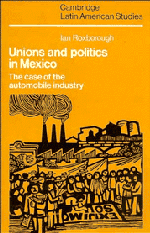Book contents
- Frontmatter
- Contents
- List of tables
- List of figures
- Acknowledgements
- Dedication
- Preface
- List of abbreviations
- Map: Location of automobile plants
- 1 Organized labour in Mexico
- 2 The Mexican automobile industry
- 3 Wages and workers in the Mexican automobile industry
- 4 The unions: a historical analysis
- 5 The unions: power and organization
- 6 Control over work processes
- 7 Union government
- 8 The labour courts
- 9 The empirical findings and the dynamics of industrial militancy
- 10 Unions and political stability in Mexico
- Notes
- Bibliography
- Index
- CAMBRIDGE LATIN AMERICAN STUDIES
10 - Unions and political stability in Mexico
Published online by Cambridge University Press: 04 August 2010
- Frontmatter
- Contents
- List of tables
- List of figures
- Acknowledgements
- Dedication
- Preface
- List of abbreviations
- Map: Location of automobile plants
- 1 Organized labour in Mexico
- 2 The Mexican automobile industry
- 3 Wages and workers in the Mexican automobile industry
- 4 The unions: a historical analysis
- 5 The unions: power and organization
- 6 Control over work processes
- 7 Union government
- 8 The labour courts
- 9 The empirical findings and the dynamics of industrial militancy
- 10 Unions and political stability in Mexico
- Notes
- Bibliography
- Index
- CAMBRIDGE LATIN AMERICAN STUDIES
Summary
Mexico's authoritarian political system
Many recent analyses of Mexican politics stress the authoritarian features of the political system and the way in which the stability of the regime rests, at least in part, on the control and co-optation of organized labour. According to Lawrence Whitehead,
what one might almost call the establishment view of Mexican and foreign social scientists is that twentieth-century Mexico underwent a bourgeois revolution, clearing the way for a strong state to emerge, one that would be firmly committed to the process of capitalist industrialization. In pursuit of this aim, semi-corporatist forms of political control have been elaborated, peasant, working class and intellectual resistance have been curbed or co-opted, and a powerful process for the redistribution of resources toward the rich (often allied with foreign corporations) have been set in motion.
This orthodox vision of the Mexican polity clearly implies that insurgent movements within the ranks of organized labour are likely to be ephemeral or irrelevant. If they pose any threat to the status quo such movements will be either repressed or brought into the official system of control. As was noted in chapter 1, such arguments are frequently made for other Latin American countries as well.
The argument, elaborated by Guillermo O'Donnell and others, may be summarized briefly as follows: the exigencies of capital accumulation in certain types of peripheral regimes require a strong and autonomous state which will, inter alia, exert control over unions in order to prevent wages from rising too fast (i.e. to the detriment of capital accumulation) and will keep strike activity to a low and manageable level so as not to scare off potential investors.
- Type
- Chapter
- Information
- Unions and Politics in MexicoThe Case of the Automobile Industry, pp. 164 - 175Publisher: Cambridge University PressPrint publication year: 1984



